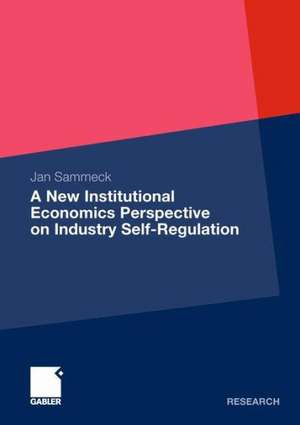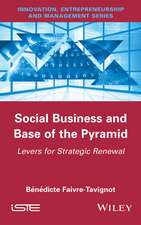A New Institutional Economics Perspective on Industry Self-Regulation
Autor Jan Sammecken Limba Engleză Paperback – 29 noi 2011
Preț: 380.07 lei
Nou
Puncte Express: 570
Preț estimativ în valută:
72.73€ • 76.12$ • 60.53£
72.73€ • 76.12$ • 60.53£
Carte tipărită la comandă
Livrare economică 31 martie-14 aprilie
Preluare comenzi: 021 569.72.76
Specificații
ISBN-13: 9783834935410
ISBN-10: 3834935417
Pagini: 192
Ilustrații: XIII, 175 p. 14 illus.
Dimensiuni: 148 x 210 x 10 mm
Greutate: 0.23 kg
Ediția:2012
Editura: Gabler Verlag
Colecția Gabler Verlag
Locul publicării:Wiesbaden, Germany
ISBN-10: 3834935417
Pagini: 192
Ilustrații: XIII, 175 p. 14 illus.
Dimensiuni: 148 x 210 x 10 mm
Greutate: 0.23 kg
Ediția:2012
Editura: Gabler Verlag
Colecția Gabler Verlag
Locul publicării:Wiesbaden, Germany
Public țintă
ResearchCuprins
A Concept of Demand for Industry Self-Regulation.- The Supply of Self-Regulation.- The Incorporation of Concept und Context.- Implications of an Institutional Approach to Self-Regulation.?
Notă biografică
Jan Sammeck is a research associate at the Dr. Werner Jackstädt Chair of Economic and Business Ethics at Handelshochschule Leipzig, where he also obtained his doctorate.
Textul de pe ultima copertă
The idea of self-regulation as an instrument capable of mitigating socially undesirable practices in industries - such as corruption, environmental degradation, or the violation of human rights - is receiving substantial consideration in theory and practice. By approaching this phenomenon with the theory of the New Institutional Economics, Jan Sammeck develops an analytical approach that points out the critical mechanisms which decide about the effectiveness of this instrument. By integrating theory with practical examples of self-regulation, this study highlights the necessity to look at the institutional incentives of an industry, in order to come to a sound judgement about the feasibility and effectiveness of this instrument in a given situation.
Caracteristici
Self-regulation as a means of mitigating socially undesirable practices in industries










